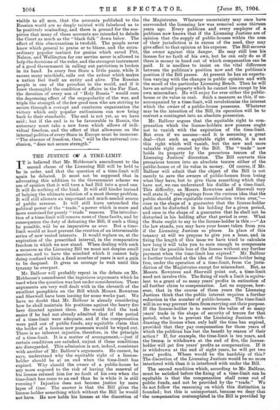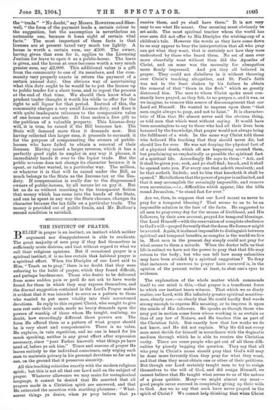I T is believed that Mr. Hobhouse's amendment to the second
clause of the Licensing Bill will be held to be in order, and that the question of a time-limit will again be debated. It must not be supposed that in advocating this addition to the Government scheme we are of opinion that it will turn a bad Bill into a good one. It will do nothing of the kind. It will still hinder instead of helping the ultimate solution of a most thorny problem. It will still alienate an important and much-needed source of public revenue. It will still leave untouched the political power of the "trade," a power which is more and more exercised for purely " trade " reasons. The introduc- tion of a time-limit will remove none of these faults, and by consequence the duty of defeating the Bill, if such a thing be possible, will be as imperative as ever. But a time- limit would at least prevent the creation of an interminable series of new vested interests. It would replace us, at the expiration of the prescribed interval, in the comparative freedom in which we now stand. When dealing with such a measure as the Licensing Bill we must not despise small mercies, and to have the mischief which it cannot help doing confined within a fixed number of years is not a gain to be despised. It gives us courage to wait until this tyranny be overpast.
Mr. Balfour will probably repeat in the debate on Mr. Hobhouse's amendment the ingenious arguments which he used when the question was last under consideration. These arguments are very well dealt with in the eleventh of the excellent pamphlets on the Bill which Messrs. Rowntree and Sherwell have been issuing for some weeks past. We have no doubt that Mr. Balfour is already considering how he shall maintain his positions against the heavy fire here directed against them. He would find the task easier if he had not already admitted that if the period of a time-limit were adequate, and if the compensation were paid out of public funds, any equitable claim that the holder of a license now possesses would be wiped out. There is no inherent injustice, therefore, in the principle of a time-limit. It is a matter of arrangement,—just if certain conditions are satisfied, unjust if these conditions are disregarded. This admission is not, indeed, consistent with another of Mr. Balfour's arguments. He cannot, he says, understand why the equitable right of a license- holder should be at an end when the time-limit has expired. Why should the owner of a public-house be any more exposed to the risk of having the renewal of his license refused him for no fault of his own when the time-limit has come to an end than he is while it is still running ? Injustice does not become justice by mere lapse of time. The answer is that the Bill gives the license-holder something which without the Bill he would not have. - He now holds his license at the discretion of publican now knows that if the Licensing Justices are of opinion that the supply of public-houses within the area of their jurisdiction is in excess of the need, they may give effect to that opinion at his expense. The Bill secures the owner against this danger. He may still lose his license for no fault of his own, but he can only do so if there is money in hand out of which compensation can be paid. It is needless to insist on the vital difference between the publican's position now and the publican's position if the Bill passes. At present he has an expecta- tion varying with the changes in public opinion and with the mood of the particular Licensing Bench. Then he will have an actual property which he cannot lose except by his own misconduct. He will enjoy for ever either the public- house or its value in cash. Such a measure as this, if un- accompanied by a time-limit, will revolutionise the interest which the owner of a public-house possesses. Whatever may be the intention of the Bill, its operation will be to convert a contingent into an absolute posssesion.
Mr. Balfour argues that the equitable right to com- pensation which the license-holders now possess ought not to vanish with the expiration of the time-limit.
But even if we assume—and it is assuming a great deal—that such an equitable right exists, it is not this right which will vanish, but the now and more valuable right created by the Bill. The " trade" now holds its property by the precarious tenure of the Licensing Justices' discretion. The Bill converts this precarious tenure into an absolute tenure either of the public-house or of its value in money. Of course, if Mr. Balfour will admit that the object of the Bill is not merely to save the owners of public-houses from losing what they have, but to give them something which they have not, we can understand his dislike of a time-limit. This difficulty, as Messrs. Rowntree and Sherwell very well state it, "really sfirings from the curious idea that the public should give equitable consideration twice over,"— once in the shape of a guarantee that the license-holder shall not be disturbed in his holding for a given period, and once in the shape of a guarantee that he shall not be disturbed in his holding after that period is over. What the State ought to say to the license-holder is this :—" As the law stands, you may have your house taken from you if the Licensing Justices so please. In place of this tenancy at will we propose to give you a lease, and in fixing the length of this lease we have tried to calculate how long it will take you to earn enough to compensate you'for the possible loss of the license without any further payment when the time-limit has expired." Mr. Balfour is further troubled at the idea of the license-holder being free, under the operation of a time-limit, from the juris- diction of the Magistrates except for misconduct. But, as Messrs. Rowntree and Sherwell point out, a time-limit need not involve this. The fixing of such a limit is equiva- lent to a grant of so many years' profits in extinction of all further claim to compensation. Let us suppose, how- ever, that in the course of these years the Licensing Justices think that the public interest requires a further reduction in the number of public-houses. The time-limit will in no way prevent them from carrying out their purpose. If the license-holder is to receive the value of so many years' trade in the shape of security of tenure for that period, what is to prevent the Licensing Justices with- drawing the license when only half the time has expired, provided that they pay compensation for those years of which the publican has lost the benefit by reason of their action ? If, for example, the time-limit is ten years, and the license is withdrawn at the end of five, the license- holder will get five years' profits as compensation. If it is withdrawn at the end of eight years, he will get two years' profits. Where would be the hardship of this ? The discretion of the Licensing Justicds would be no more interfered with than it is interfered with under the Bill.
The second condition which, according to Mr. Balfour, must be satisfied before the fixing of a time-limit can be equitable is that the compensation shall come out of public funds, and not be provided by the "trade." We do not follow the reasoning on which this distinction is founded; but this is unimportant, because we deny that the compensation contemplated in the Bill is provided by the ." trade." "No doubt," say Messrs. Rowntree and Sher- well, "the form of the payment lends a certain colour to the suggestion, but the assumption is nevertheless an untenable one, because it loses sight of certain vital facts." The most important of these facts is that licenses are at present taxed very much too lightly. A house is worth a certain sum, say £500. The owner, having given that sum for it, applies to the Licensing Justices for leave to open it as a public-house. The leave is given, and the house at once becomes worth a very much greater sum, say £2,000. This additional value is a gift from the community to one of its members, and the com- munity very properly exacts in return the payment of a certain annual duty. One obvious way of ascertaining what this duty ought to be would be to put the license up to public tender for a short term, and to repeat the process at the end of that time. We should then know what a prudent trader thought it worth his while to offer for the right to sell liquor for that period. Instead of this, the community charges a very small License-duty, and fixes it with quite inadequate reference to the comparative value of one house over another. It thus makes a free gift to the publican of a valuable property. This License-duty will, it is true, be raised if the Bill becomes law. The State will demand more than it demands now. But having collected this larger sum, it proceeds to earmark it for the purpose of compensating the owners of public- houses who have failed to obtain a renewal of their licenses. Having raised a larger revenue, which it has a perfectly good right to employ in any way it pleases, it immediately hands it over to the liquor trade. But the public revenue does not change its character because it is spent, or rather wasted, in a particular way. The million, or whatever it is that will be raised under the Bill, as much belongs to the State as the Income-tax or the Tea- duty. If compensation is really due to the dispossessed owners of public-houses, by all means let us pay it. But let us do so without resorting to the transparent fiction that money which has come into the hands of the State, and can be spent in any way the State chooses, changes its character because the tax falls on a particular trade. The money is provided out of public funds, and Mr. Balfour's second condition is satisfied.



























































 Previous page
Previous page